
Unit 2 Lessons from Jefferson I.Teaching Aims 1.Enlarge the students'vocabulary by learning the new words and doing the vocabulary exercises. 2.Help the studentstoget the general ideaof the article. 3.Help the students leam from Jefferson. 4.Help the students to build up their language skills through more exercises on oral practice,phrases and expression,grammar,writing,etc. II.Key and Difficult Points 1.New Words and Phrases obtain,appoint,on-the-spot,by birth,humble,go out of one's to do,threaten. hesitate,conflict,act on,resent,be chained to sth.leave behind,superior,in existence above all,owe...to 2.Sentences (1)Jefferson believed that a free man obtains knowledge from many sources besides books and that personal investigation is important. (2)By birth and by education Jefferson belonged to the highest social class. (3)Yet,in a day when few noble persons ever spoke to those of humble origins except to give an order,Jefferson went out of his way to talk with gardeners. servants,and waiters. (4)Were it left to me to decide whether we should have a government without newspapers or newspapers without a government,I should not hesitate a moment to prefer the latter. (5)It is conflict and not unquestioning agreement that keeps freedom alive III.Teaching Methods Discussion,explanation,ask and answer IV.Time:4 periods V.Teaching Procedures:
Unit 2 Lessons from Jefferson I. Teaching Aims 1. Enlarge the students’ vocabulary by learning the new words and doing the vocabulary exercises. 2. Help the students to get the general idea of the article. 3. Help the students learn from Jefferson. 4. Help the students to build up their language skills through more exercises on oral practice, phrases and expression, grammar, writing, etc. II. Key and Difficult Points 1. New Words and Phrases obtain, appoint, on-the-spot, by birth, humble, go out of one’s to do, threaten, hesitate, conflict, act on, resent, be chained to sth., leave behind, superior, in existence, above all, owe…to 2. Sentences (1) Jefferson believed that a free man obtains knowledge from many sources besides books and that personal investigation is important. (2) By birth and by education Jefferson belonged to the highest social class. (3) Yet, in a day when few noble persons ever spoke to those of humble origins except to give an order, Jefferson went out of his way to talk with gardeners, servants, and waiters. (4) Were it left to me to decide whether we should have a government without newspapers or newspapers without a government, I should not hesitate a moment to prefer the latter. (5) It is conflict and not unquestioning agreement that keeps freedom alive. III. Teaching Methods Discussion, explanation, ask and answer IV. Time: 4 periods V. Teaching Procedures:
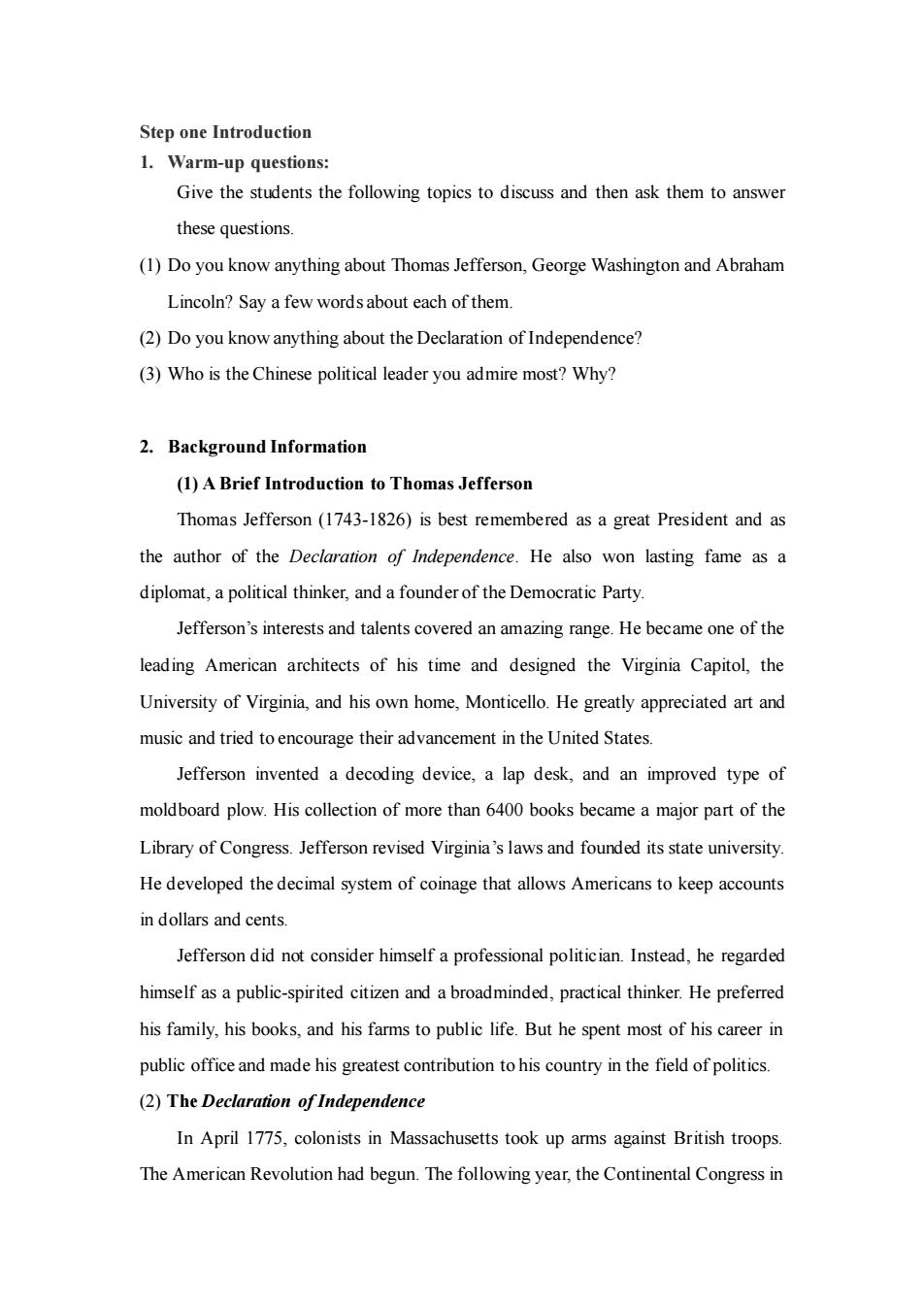
Step one Introduction 1.Warm-up questions: Give the students the following topics to discuss and then ask them to answer these questions (1)Do you know anything about Thomas Jefferson,George Washington and Abraham Lincoln?Say a few words about each of them. (2)Do you know anything about the Declaration of Independence? ()Who is the Chinese political leader you admire most?Why? 2.Background Information (1)A Brief Introduction to Thomas Jefferson Thomas Jefferson(1743-1826)is best remembered as a great President and as the author of the Declaration of Independence.He also won lasting fame as a diplomat,a political thinker,and a founder of the Democratic Party Jefferson's interests and talents covered an amazing range.He became one of the leading American architects of his time and designed the Virginia Capitol,the University of Virginia,and his own home,Monticello.He greatly appreciated art and music and tried toencourage their advancement in the United States Jefferson invented a decoding device,a lap desk,and an improved type of moldboard plow.His collection of more than 6400 books became a major part of the Library of Congress.Jefferson revised Virginia's laws and founded its state university He developed the decimal system of coinage that allows Americans to keep accounts in dollars and cents. Jefferson did not consider himself a professional politician.Instead,he regarded himself as a public-spirited citizen and a broadminded,practical thinker.He preferred his family,his books,and his farms to public life.But he spent most of his career in public office and made his greatest contribution to his country in the field of politics. (2)The Declaration of Independence In April 1775,colonists in Massachusetts took up arms against British troops. The American Revolution had begun.The following year,the Continental Congress in
Step one Introduction 1. Warm-up questions: Give the students the following topics to discuss and then ask them to answer these questions. (1) Do you know anything about Thomas Jefferson, George Washington and Abraham Lincoln? Say a few words about each of them. (2) Do you know anything about the Declaration of Independence? (3) Who is the Chinese political leader you admire most? Why? 2. Background Information (1) A Brief Introduction to Thomas Jefferson Thomas Jefferson (1743-1826) is best remembered as a great President and as the author of the Declaration of Independence. He also won lasting fame as a diplomat, a political thinker, and a founder of the Democratic Party. Jefferson’s interests and talents covered an amazing range. He became one of the leading American architects of his time and designed the Virginia Capitol, the University of Virginia, and his own home, Monticello. He greatly appreciated art and music and tried to encourage their advancement in the United States. Jefferson invented a decoding device, a lap desk, and an improved type of moldboard plow. His collection of more than 6400 books became a major part of the Library of Congress. Jefferson revised Virginia’s laws and founded its state university. He developed the decimal system of coinage that allows Americans to keep accounts in dollars and cents. Jefferson did not consider himself a professional politician. Instead, he regarded himself as a public-spirited citizen and a broadminded, practical thinker. He preferred his family, his books, and his farms to public life. But he spent most of his career in public office and made his greatest contribution to his country in the field of politics. (2) The Declaration of Independence In April 1775, colonists in Massachusetts took up arms against British troops. The American Revolution had begun. The following year, the Continental Congress in
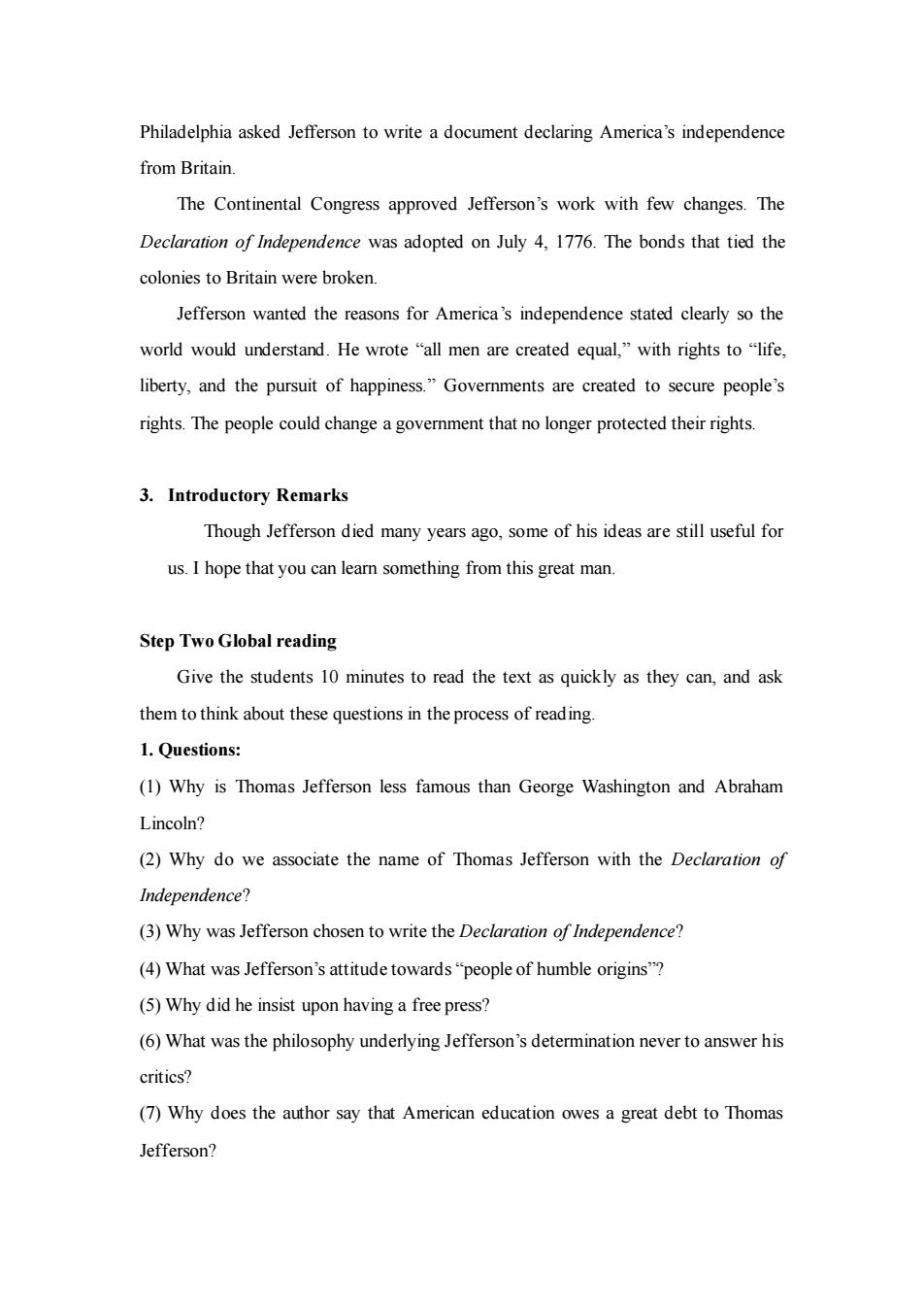
Philadelphia asked Jefferson to write a document declaring America's independence from Britain. The Continental Congress approved Jefferson's work with few changes.The Declaration of Independence was adopted on July 4,1776.The bonds that tied the colonies to Britain were broken. Jefferson wanted the reasons for America's independence stated clearly so the world wouk understand.He wrote"all men are created equal,"with rights to"life liberty,and the pursuit of happiness."Govemments are created to secure people's rights.The people could change a government that no longer protected their rights. 3.Introductory Remarks Though Jefferson died many years ago,some of his ideas are still useful for us.I hope that you can learn something from this great man. Step Two Global reading Give the students 10 minutes to read the text as quickly as they can,and ask them to think about these questions in the process of reading. 1.Questions: (1)Why is Thomas Jefferson less famous than George Washington and Abraham Lincoln? (2)Why do we associate the name of Thomas Jefferson with the Declaration of Independence? ()Why was Jefferson chosen to write the Declaration of Independence? (4)What was Jefferson's attitude towards"people of humble origins"? (5)Why did he insist upon having a free press? (6)What was the philosophy underlying Jefferson's determination never to answer his critics? (7)Why does the author say that American education owes a great debt to Thomas Jefferson?
Philadelphia asked Jefferson to write a document declaring America’s independence from Britain. The Continental Congress approved Jefferson’s work with few changes. The Declaration of Independence was adopted on July 4, 1776. The bonds that tied the colonies to Britain were broken. Jefferson wanted the reasons for America’s independence stated clearly so the world would understand. He wrote “all men are created equal,” with rights to “life, liberty, and the pursuit of happiness.” Governments are created to secure people’s rights. The people could change a government that no longer protected their rights. 3. Introductory Remarks Though Jefferson died many years ago, some of his ideas are still useful for us. I hope that you can learn something from this great man. Step Two Global reading Give the students 10 minutes to read the text as quickly as they can, and ask them to think about these questions in the process of reading. 1. Questions: (1) Why is Thomas Jefferson less famous than George Washington and Abraham Lincoln? (2) Why do we associate the name of Thomas Jefferson with the Declaration of Independence? (3) Why was Jefferson chosen to write the Declaration of Independence? (4) What was Jefferson’s attitude towards “people of humble origins”? (5) Why did he insist upon having a free press? (6) What was the philosophy underlying Jefferson’s determination never to answer his critics? (7) Why does the author say that American education owes a great debt to Thomas Jefferson?
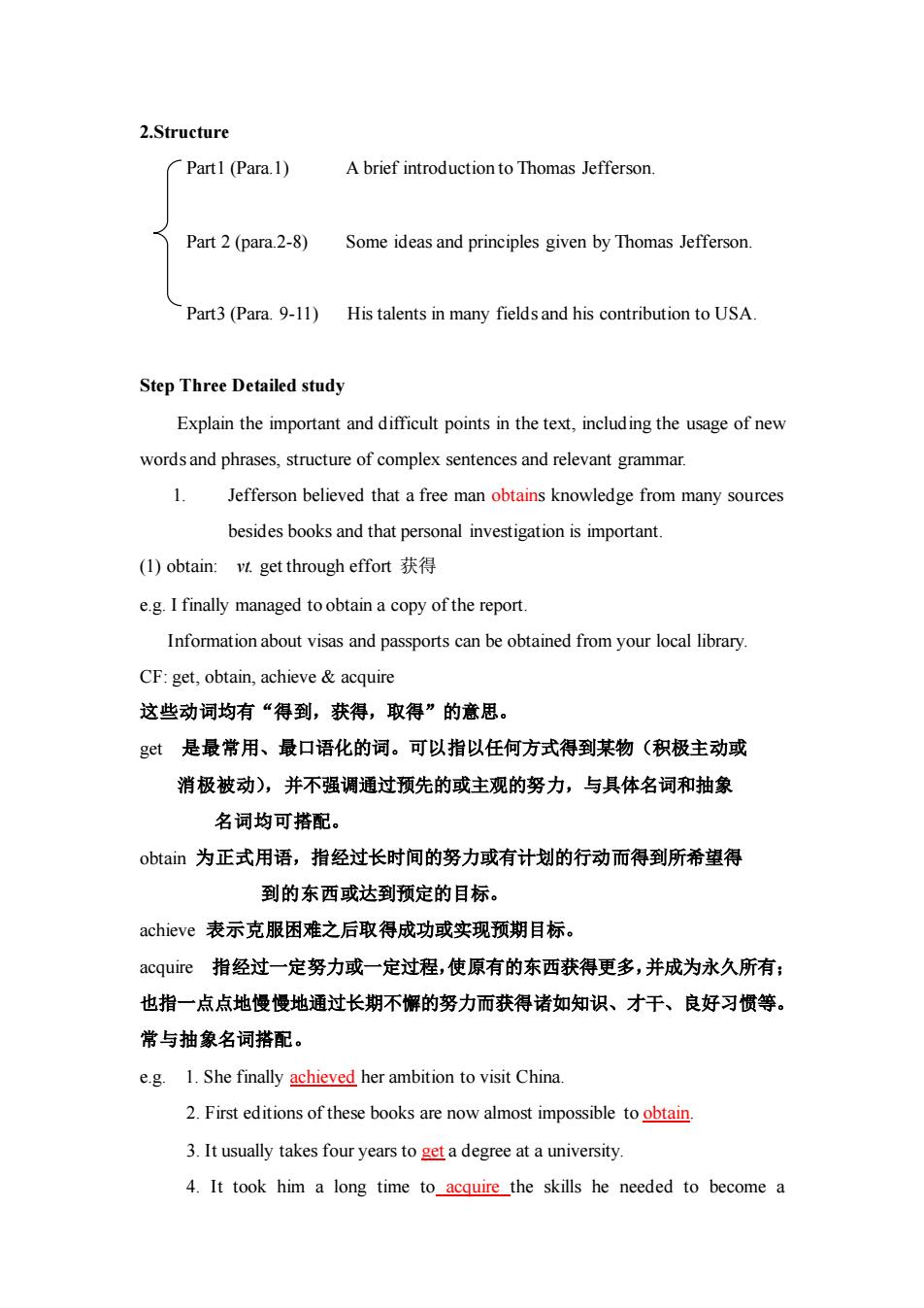
2.Structure Part1(Para.1) A brief introduction to Thomas Jefferson. Part 2(para.2-8) Some ideas and principles given by Thomas Jefferson Part3(Para.9-11)His talents in many fields and his contribution to USA Step Three Detailed study Explain the important and difficult points in the text,including the usage of new words and phrases,structure of complex sentences and relevant gramma 1.Jefferson believed that a free man obtains knowledge from many sources besides books and that personal investigation is important. (I)obtain:v以.get through effort获得 e.g.I finally managed to obtain a copy of the report. Information about visas and passports can be obtained from your local library. CF:get,obtain,achieve&acquire 这些动词均有“得到,获得,取得”的意思。 g是最常用、最口语化的词。可以指以任何方式得到某物(积极主动或 消极被动),并不强调通过预先的或主观的努力,与具体名词和抽象 名词均可搭配。 obtain为正式用语,指经过长时间的务力或有计划的行动而得到所希望得 到的东西或达到预定的目标。 achieve表示克服困难之后取得成功或实现预期目标。 acquire指经过一定努力或一定过程,使原有的东西获得更多,并成为永久所有: 也指一点点地慢慢地通过长期不懈的努力而获得诸如知识、才干、良好习惯等。 常与抽象名词搭配。 e.g.1.She finally achieved her ambition to visit China. 2.First editions of these books are now almost impossible to obtain 3.It usually takes four years to get a degree at a university. 4.It took him a long time to acquire the skills he needed to become a
2.Structure Part1 (Para.1) A brief introduction to Thomas Jefferson. Part 2 (para.2-8) Some ideas and principles given by Thomas Jefferson. Part3 (Para. 9-11) His talents in many fields and his contribution to USA. Step Three Detailed study Explain the important and difficult points in the text, including the usage of new words and phrases, structure of complex sentences and relevant grammar. 1. Jefferson believed that a free man obtains knowledge from many sources besides books and that personal investigation is important. (1) obtain: vt. get through effort 获得 e.g. I finally managed to obtain a copy of the report. Information about visas and passports can be obtained from your local library. CF: get, obtain, achieve & acquire 这些动词均有“得到,获得,取得”的意思。 get 是最常用、最口语化的词。可以指以任何方式得到某物(积极主动或 消极被动),并不强调通过预先的或主观的努力,与具体名词和抽象 名词均可搭配。 obtain 为正式用语,指经过长时间的努力或有计划的行动而得到所希望得 到的东西或达到预定的目标。 achieve 表示克服困难之后取得成功或实现预期目标。 acquire 指经过一定努力或一定过程,使原有的东西获得更多,并成为永久所有; 也指一点点地慢慢地通过长期不懈的努力而获得诸如知识、才干、良好习惯等。 常与抽象名词搭配。 e.g. 1. She finally achieved her ambition to visit China. 2. First editions of these books are now almost impossible to obtain. 3. It usually takes four years to get a degree at a university. 4. It took him a long time to acquire the skills he needed to become a
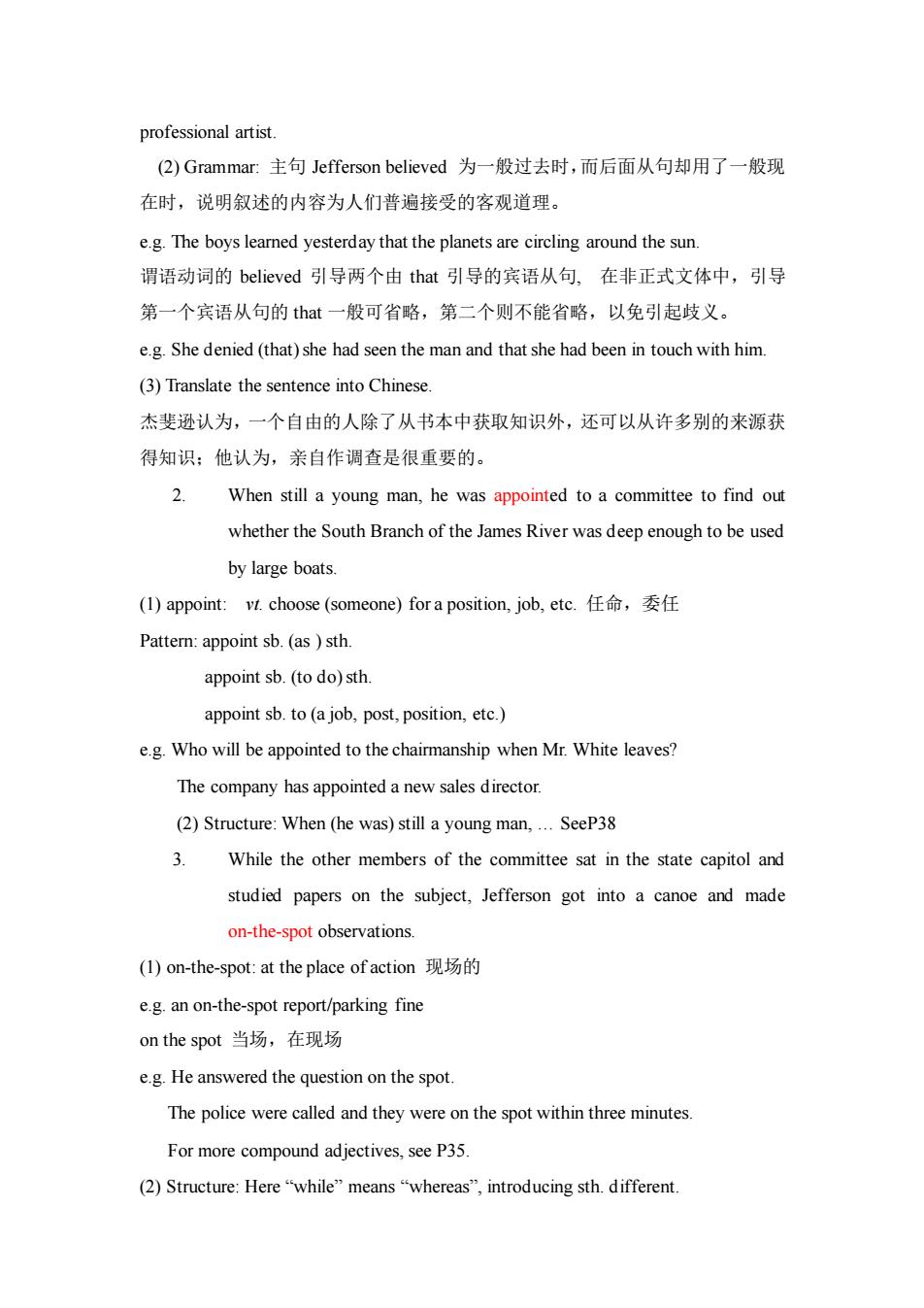
professional artist. (2)Grammar:主句Jefferson believed为一般过去时,而后面从句却用了一般现 在时,说明叙述的内容为人们普遍接受的客观道理。 e.g.The boys learned yesterday that the planets are circling around the sun. 谓语动词的believed引导两个由that引导的宾语从句,在非正式文体中,引导 第一个宾语从句的that一般可省略,第二个则不能省略,以免引起歧义。 e.g.She denied (that)she had seen the man and that she had been in touch with him (3)Translate the sentence into Chinese 杰斐逊认为,一个自由的人除了从书本中获取知识外,还可以从许多别的来源获 得知识:他认为,亲自作调查是很重要的。 2. When still a young man,he was appointed to a committee to find out whether the South Branch of the James River was deep enough to be used by large boats. ()appoint:v.choose(someone)fora position,job,ctc.任命,委任 Patter:appoint sb.(as)sth. appoint sb.(to do)sth. appoint sb.to(a job,post,position,ete.) e.g.Who will be appointed to the chairmanship when Mr.White leaves? The company has appointed a new sales director. (2)Structure:When (he was)still a young man,...SeeP38 3. While the other members of the committee sat in the state capitol and studied papers on the subject,Jefferson got into a canoe and made on-the-spot observations. (I)on-the-spot:at the place of action现场的 e.g.an on-the-spot report/parking fine on the spot当场,在现场 e.g.He answered the question on the spot. The police were called and they were on the spot within three minutes. For more compound adjectives,see P35. (2)Structure:Here“while”means“whereas'”,introducing sth..different
professional artist. (2) Grammar: 主句 Jefferson believed 为一般过去时,而后面从句却用了一般现 在时,说明叙述的内容为人们普遍接受的客观道理。 e.g. The boys learned yesterday that the planets are circling around the sun. 谓语动词的 believed 引导两个由 that 引导的宾语从句, 在非正式文体中,引导 第一个宾语从句的 that 一般可省略,第二个则不能省略,以免引起歧义。 e.g. She denied (that) she had seen the man and that she had been in touch with him. (3) Translate the sentence into Chinese. 杰斐逊认为,一个自由的人除了从书本中获取知识外,还可以从许多别的来源获 得知识;他认为,亲自作调查是很重要的。 2. When still a young man, he was appointed to a committee to find out whether the South Branch of the James River was deep enough to be used by large boats. (1) appoint: vt. choose (someone) for a position, job, etc. 任命,委任 Pattern: appoint sb. (as ) sth. appoint sb. (to do) sth. appoint sb. to (a job, post, position, etc.) e.g. Who will be appointed to the chairmanship when Mr. White leaves? The company has appointed a new sales director. (2) Structure: When (he was) still a young man, … SeeP38 3. While the other members of the committee sat in the state capitol and studied papers on the subject, Jefferson got into a canoe and made on-the-spot observations. (1) on-the-spot: at the place of action 现场的 e.g. an on-the-spot report/parking fine on the spot 当场,在现场 e.g. He answered the question on the spot. The police were called and they were on the spot within three minutes. For more compound adjectives, see P35. (2) Structure: Here “while” means “whereas”, introducing sth. different

e.g.Jane was dressed in brown while Mary was dressed in blue. You like sports,while I'd rather read. For the usage of“while”,see P13 in our book. 4.By birth and by education Jefferson belonged to the highest social class. ()by birth:so far as family origin or nationality is concemed就出身而言 e.g.My parents are both Indian by birth,but they have American citizenship. He is British by birth,although he was born in France. Phrasesa:give birth“生孩子;产仔”give birth to“生(孩子):产生:引起 (2)Meaning:Judging by his family and educational background,Jefferson was a member of the group with top social status (3)Translate the sentence into Chinese. 按出身及其所受的教育,杰斐逊均属于最高的社会阶层。 Yet,in a day when few noble persons ever spoke to those of humble origins except to give an order.Jefferson went ou of his way to talk with gardeners,servants,and waiters. (1)humble:adj. I)low in position卑微的 e.g.Even when she became rich and famous,she never forgot her humble background. The school had provided a good education for children of humble backgrounds. 2)having a modest opinion of oneself谦虚的 e.g.In my humble opinion,we should never have bought the car in the first place. (2)go out of one's way (to do sth.):take particular trouble or make a special effort(to dosh)特地,专门 e.g.Both parties are going out of their way to reach a compromise. It was good of you to go out of your way to meet us at the station. (3)Q:What's the implied meaning of the sentence? A:The noble persons thought they were superior and looked down upon the people of humble origins and regarded talking with those people as degrading. But sometimes they had to because they had to order those people to do things
e.g. Jane was dressed in brown while Mary was dressed in blue. You like sports, while I’d rather read. For the usage of “while”, see P13 in our book. 4. By birth and by education Jefferson belonged to the highest social class. (1) by birth: so far as family origin or nationality is concerned 就出身而言 e.g. My parents are both Indian by birth, but they have American citizenship. He is British by birth, although he was born in France. Phrases: give birth “生孩子;产仔” give birth to “生(孩子);产生;引起” (2) Meaning: Judging by his family and educational background, Jefferson was a member of the group with top social status. (3) Translate the sentence into Chinese. 按出身及其所受的教育,杰斐逊均属于最高的社会阶层。 5. Yet, in a day when few noble persons ever spoke to those of humble origins except to give an order, Jefferson went out of his way to talk with gardeners, servants, and waiters. (1) humble: adj. 1) low in position 卑微的 e.g. Even when she became rich and famous, she never forgot her humble background. The school had provided a good education for children of humble backgrounds. 2) having a modest opinion of oneself 谦虚的 e.g. In my humble opinion, we should never have bought the car in the first place. (2) go out of one’s way (to do sth.): take particular trouble or make a special effort ( to do sth.) 特地,专门 e.g. Both parties are going out of their way to reach a compromise. It was good of you to go out of your way to meet us at the station. (3) Q: What’s the implied meaning of the sentence? A: The noble persons thought they were superior and looked down upon the people of humble origins and regarded talking with those people as degrading. But sometimes they had to because they had to order those people to do things
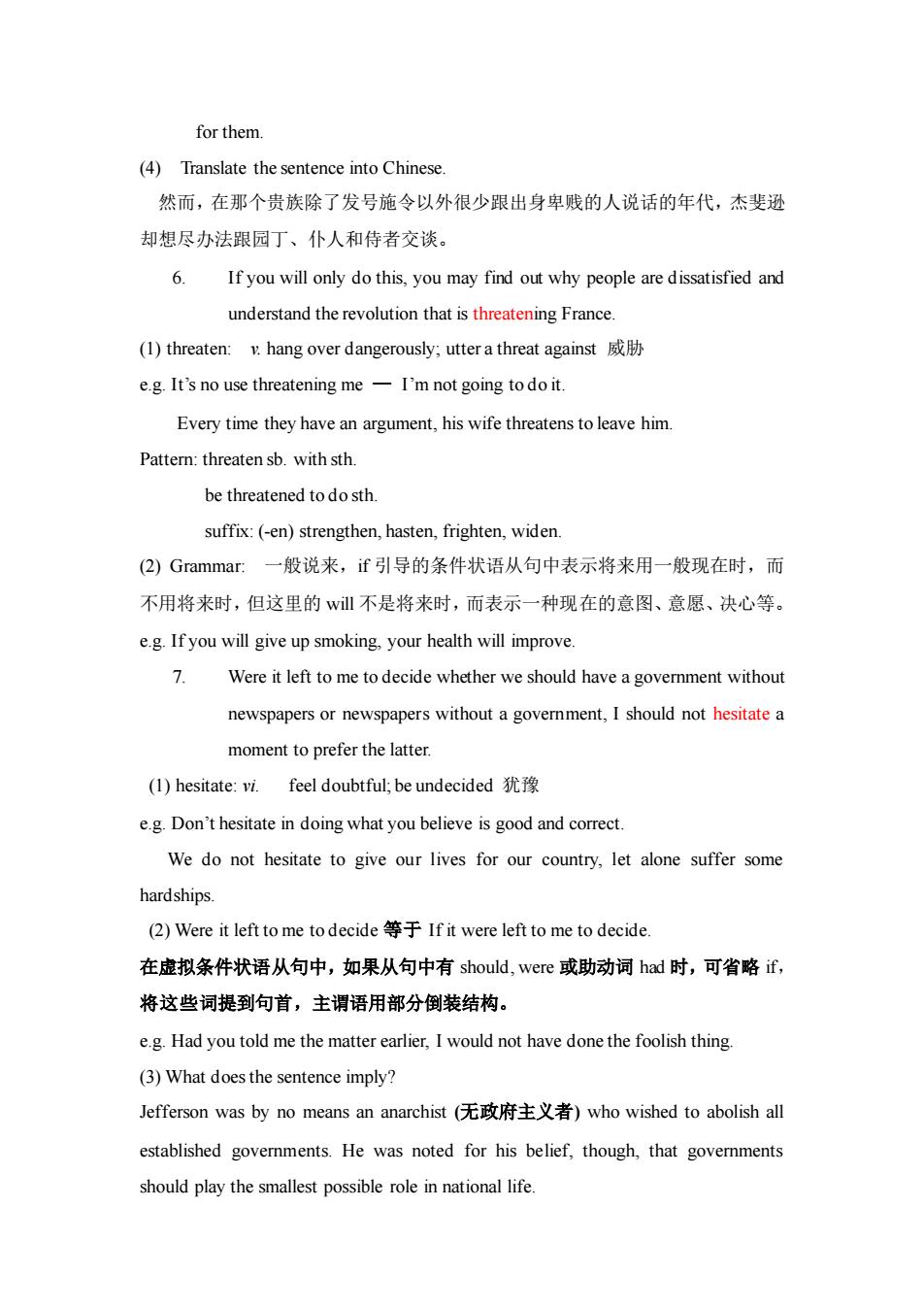
for them. (4)Translate the sentence into Chinese. 然而,在那个贵族除了发号施令以外很少跟出身卑贱的人说话的年代,杰斐逊 却想尽办法跟园丁、仆人和侍者交谈 6.If you will only do this,you may find out why people are dissatisfied and understand the revolution that is threatening France. (1)threaten:v.hang over dangerously;uttera threat against e.g.It's no use threatening me-I'm not going todo it. Every time they have an argument,his wife threatens to leave him. Pattern:threatensb.with sth. be threatened to dosth suffix:(-en)strengthen,hasten,frighten,widen. (2)Grammar::一般说来,if引导的条件状语从句中表示将来用一般现在时,而 不用将来时,但这里的w不是将来时,而表示一种现在的意图、意愿、决心等。 e.g.If you will give up smoking.your health will improve. 7.Were it left to me to decide whether we should have a government without newspapers or newspapers without a goverment,I should not hesitate a moment to prefer the latter. (1)hesitate:vi.feel doubtful;be undecided e.g.Don't hesitate in doing what you believe is good and correct. We do not hesitate to give our lives for our country,let alone suffer some hardships. (2)Were it left to me to decide If it were left to me to decide. 在虚拟条件状语从句中,如果从句中有should,were或助动词had时,可省略if, 将这些词提到句首,主谓语用部分倒装结构。 e.g.Had you told me the matter earlier,I would not have done the foolish thing. (3)What does the sentence imply? Jefferson was by no means an anarchist(无政府主义者)who wished to abolish all established governments.He was noted for his belief,though,that goverments should play the smallest possible role in national life
for them. (4) Translate the sentence into Chinese. 然而,在那个贵族除了发号施令以外很少跟出身卑贱的人说话的年代,杰斐逊 却想尽办法跟园丁、仆人和侍者交谈。 6. If you will only do this, you may find out why people are dissatisfied and understand the revolution that is threatening France. (1) threaten: v. hang over dangerously; utter a threat against 威胁 e.g. It’s no use threatening me ─ I’m not going to do it. Every time they have an argument, his wife threatens to leave him. Pattern: threaten sb. with sth. be threatened to do sth. suffix: (-en) strengthen, hasten, frighten, widen. (2) Grammar: 一般说来,if 引导的条件状语从句中表示将来用一般现在时,而 不用将来时,但这里的 will 不是将来时,而表示一种现在的意图、意愿、决心等。 e.g. If you will give up smoking, your health will improve. 7. Were it left to me to decide whether we should have a government without newspapers or newspapers without a government, I should not hesitate a moment to prefer the latter. (1) hesitate: vi. feel doubtful; be undecided 犹豫 e.g. Don’t hesitate in doing what you believe is good and correct. We do not hesitate to give our lives for our country, let alone suffer some hardships. (2) Were it left to me to decide 等于 If it were left to me to decide. 在虚拟条件状语从句中,如果从句中有 should, were 或助动词 had 时,可省略 if, 将这些词提到句首,主谓语用部分倒装结构。 e.g. Had you told me the matter earlier, I would not have done the foolish thing. (3) What does the sentence imply? Jefferson was by no means an anarchist (无政府主义者) who wished to abolish all established governments. He was noted for his belief, though, that governments should play the smallest possible role in national life
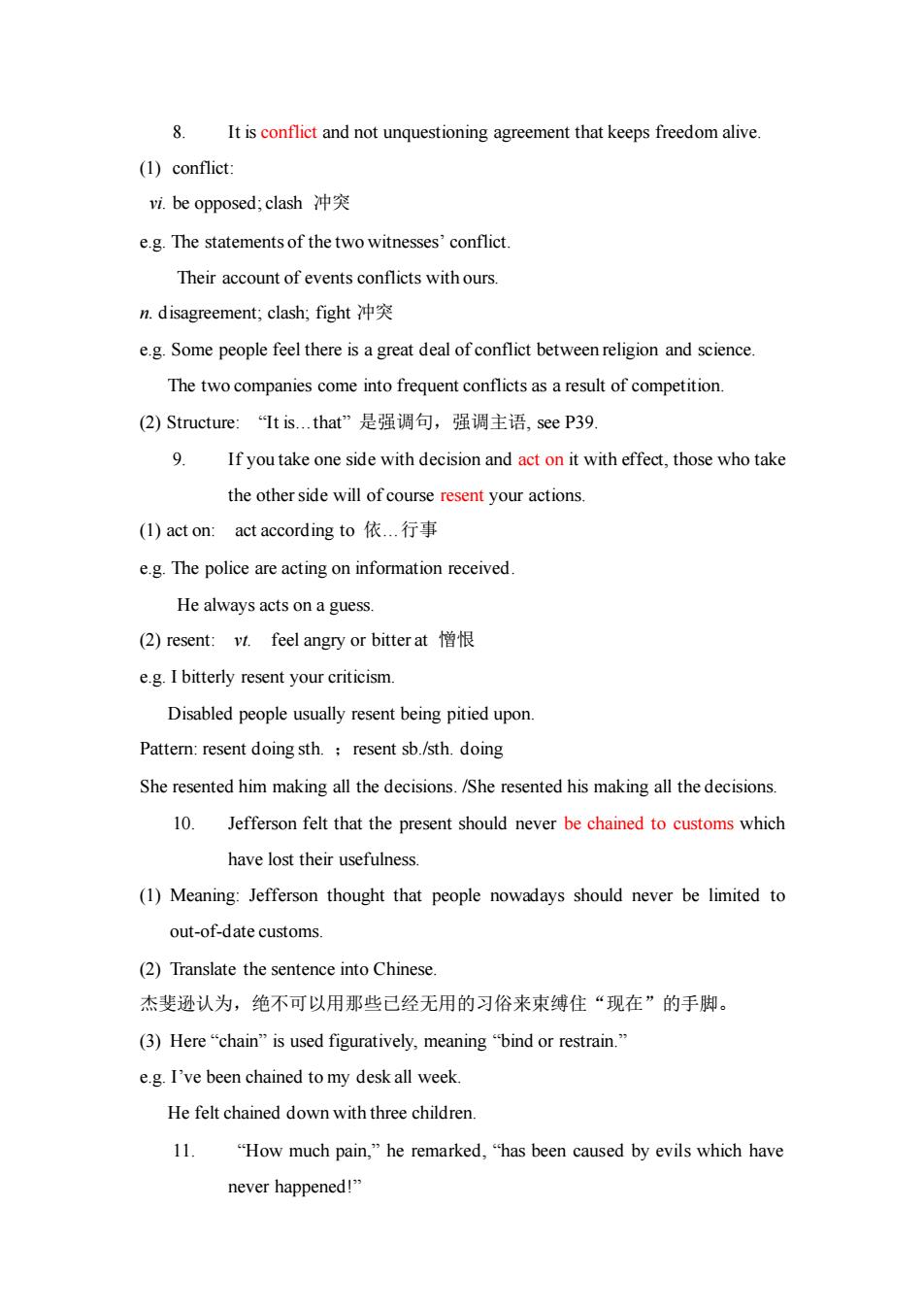
8.It is conflict and not unquestioning agreement that keeps freedom alive. (1)conflict: i.be opposed;clash冲突 e.g.The statements of the two witnesses'conflict. Their account of events conflicts with ours. n.disagreement,:clash,fight冲突 e.g.Some people feel there is a great deal of conflict between religion and science The two companies come into frequent conflicts as a result of competition. (2)Structure:tis.…that”是强调句,强调主语,seeP39. 9 If you take one side with decision and act on it with effect,those who take the other side will of course resent your actions ()act on:act according to依.行事 e.g The police are acting on information received. He always acts on a guess. (2)resent::u.feel angry or bitterat憎恨 e.g.I bitterly resent your criticism. Disabled people usually resent being pitied upon. Patter:resent doing sth.:resent sb./sth.doing She resented him making all the decisions./She resented his making all the decisions. 10.Jefferson felt that the present should never be chained to customs which have lost their usefulness (1)Meaning:Jefferson thought that people nowadays should never be limited to out-of-date customs. (2)Translate the sentence into Chinese. 杰斐逊认为,绝不可以用那些已经无用的习俗来束缚住“现在”的手脚 (3)Here"chain"is used figuratively,meaning"bind or restrain." e.g.I've been chained to my desk all week. He felt chained down with three children 11. "How much pain,"he remarked,"has been caused by evils which have never happened!
8. It is conflict and not unquestioning agreement that keeps freedom alive. (1) conflict: vi. be opposed; clash 冲突 e.g. The statements of the two witnesses’ conflict. Their account of events conflicts with ours. n. disagreement; clash; fight 冲突 e.g. Some people feel there is a great deal of conflict between religion and science. The two companies come into frequent conflicts as a result of competition. (2) Structure: “It is…that” 是强调句,强调主语, see P39. 9. If you take one side with decision and act on it with effect, those who take the other side will of course resent your actions. (1) act on: act according to 依…行事 e.g. The police are acting on information received. He always acts on a guess. (2) resent: vt. feel angry or bitter at 憎恨 e.g. I bitterly resent your criticism. Disabled people usually resent being pitied upon. Pattern: resent doing sth. ;resent sb./sth. doing She resented him making all the decisions. /She resented his making all the decisions. 10. Jefferson felt that the present should never be chained to customs which have lost their usefulness. (1) Meaning: Jefferson thought that people nowadays should never be limited to out-of-date customs. (2) Translate the sentence into Chinese. 杰斐逊认为,绝不可以用那些已经无用的习俗来束缚住“现在”的手脚。 (3) Here “chain” is used figuratively, meaning “bind or restrain.” e.g. I’ve been chained to my desk all week. He felt chained down with three children. 11. “How much pain,” he remarked, “has been caused by evils which have never happened!
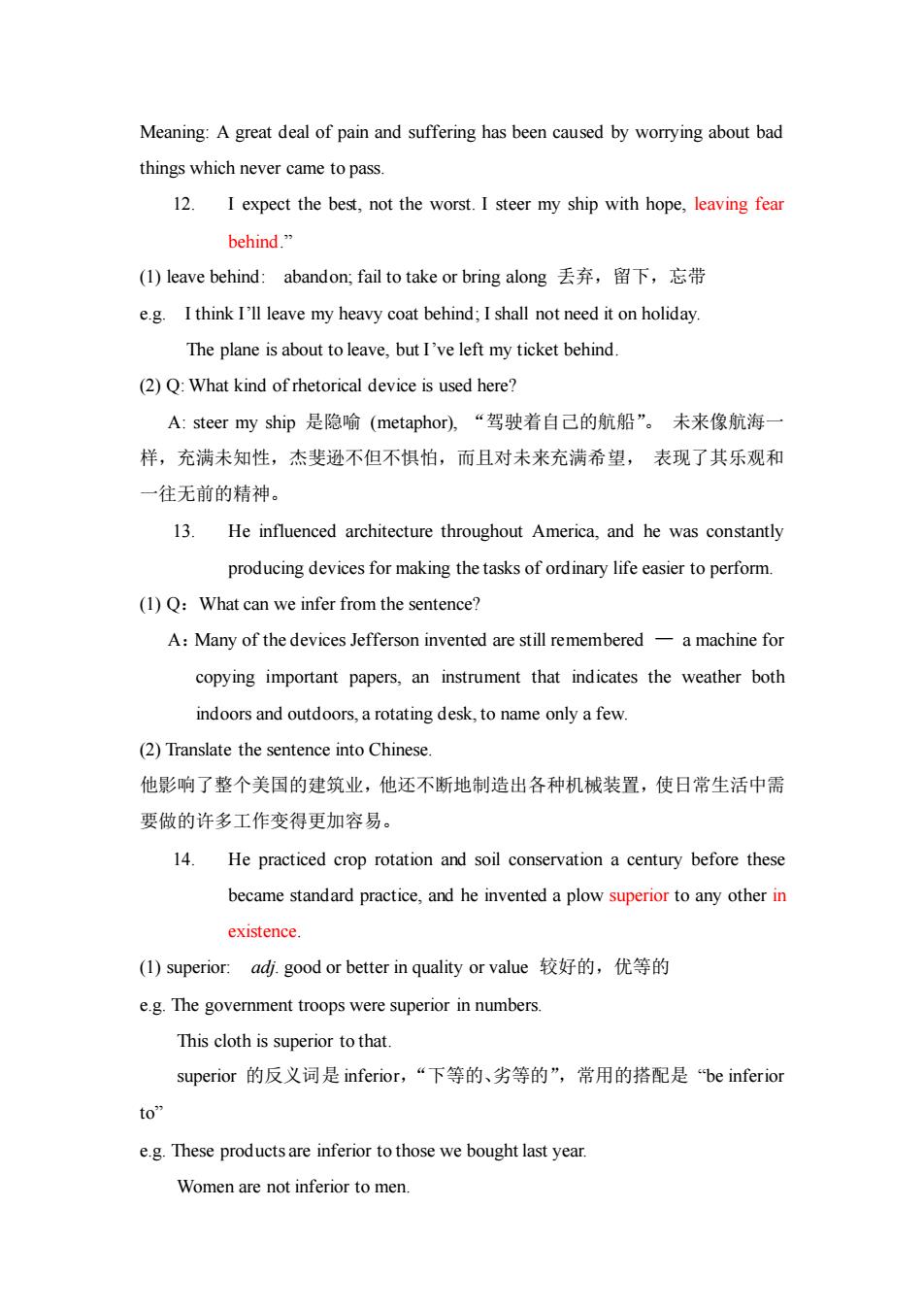
Meaning:A great deal of pain and suffering has been caused by worrying about bad things which never came to pass. 12.I expect the best,not the worst.I steer my ship with hope,leaving fear behind." (l)leave behind:abandon,fail to take or bring along丢弃,留下,忘带 e.g.I think I'll leave my heavy coat behind:I shall not need it on holiday The plane is about to leave,but I've left my ticket behind (2)Q:What kind of rhetorical device is used here? A:steer my ship是隐喻(metaphor),“驾驶着自己的航船”。未来像航海 样,充满未知性,杰斐逊不但不惧怕,而且对未来充满希望,表现了其乐观和 一往无前的精神。 13.He influenced architecture throughout America,and he was constantly producing devices for making the tasks of ordinary life easier to perform. (1)Q:What can we infer from the sentence? A:Many of the devices Jefferson invented are still remembered-a machine for copying important papers,an instrument that indicates the weather both indoors and outdoors,a rotating desk,to name only a few. (2)Translate the sentence into Chinese 他影响了整个美国的建筑业,他还不断地制造出各种机械装置,使日常生活中需 要做的许多工作变得更加容易。 14.He practiced crop rotation and soil conservation a century before these became standard practice,and he invented a plow superior to any other in existence. (I))superior:ad.good or better in quality or value较好的,优等的 e.g.The government troops were superior in numbers. This cloth is superior to that. superior的反义词是inferior,“下等的、劣等的”,常用的搭配是be inferior to" e.g.These products are inferior to those we bought last year. Women are not inferior to men
Meaning: A great deal of pain and suffering has been caused by worrying about bad things which never came to pass. 12. I expect the best, not the worst. I steer my ship with hope, leaving fear behind.” (1) leave behind: abandon; fail to take or bring along 丢弃,留下,忘带 e.g. I think I’ll leave my heavy coat behind; I shall not need it on holiday. The plane is about to leave, but I’ve left my ticket behind. (2) Q: What kind of rhetorical device is used here? A: steer my ship 是隐喻 (metaphor), “驾驶着自己的航船”。 未来像航海一 样,充满未知性,杰斐逊不但不惧怕,而且对未来充满希望, 表现了其乐观和 一往无前的精神。 13. He influenced architecture throughout America, and he was constantly producing devices for making the tasks of ordinary life easier to perform. (1) Q:What can we infer from the sentence? A:Many of the devices Jefferson invented are still remembered — a machine for copying important papers, an instrument that indicates the weather both indoors and outdoors, a rotating desk, to name only a few. (2) Translate the sentence into Chinese. 他影响了整个美国的建筑业,他还不断地制造出各种机械装置,使日常生活中需 要做的许多工作变得更加容易。 14. He practiced crop rotation and soil conservation a century before these became standard practice, and he invented a plow superior to any other in existence. (1) superior: adj. good or better in quality or value 较好的,优等的 e.g. The government troops were superior in numbers. This cloth is superior to that. superior 的反义词是 inferior,“下等的、劣等的”,常用的搭配是 “be inferior to” e.g. These products are inferior to those we bought last year. Women are not inferior to men
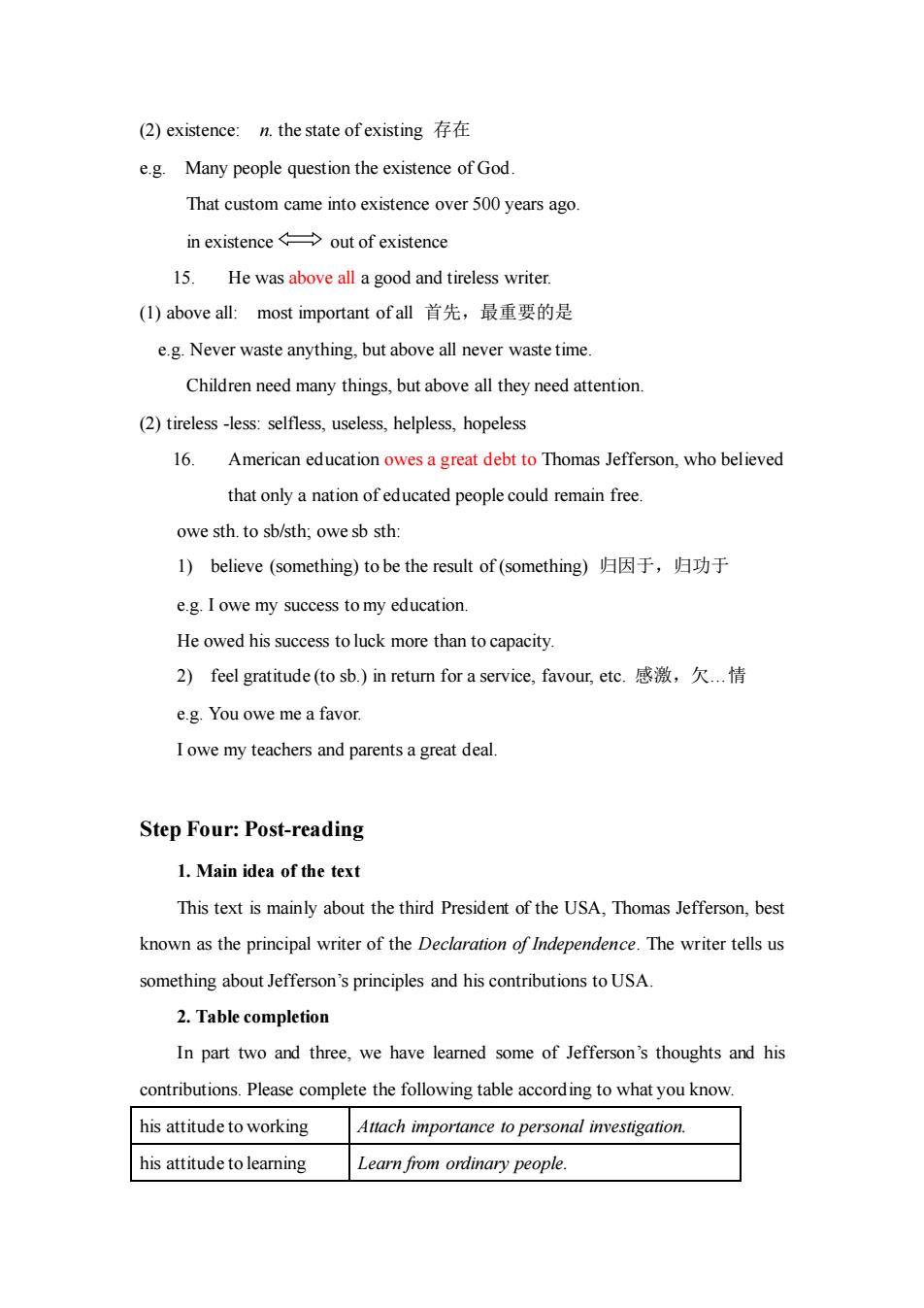
(2)existence:n.the state ofexisting存在 e.g.Many people question the existence of God. That custom came into existence over 500 years ago in existence←→out of existence 15.He was above all a good and tireless writer. (I)above all::most important of all首先,最重要的是 e.g.Never waste anything,but above all never waste time Children need many things,but above all they need attention. (2)tireless-less:selfless,useless,helpless,hopeless 16.American education owes a great debt to Thomas Jefferson,who believed that only a nation of educated people could remain free owe sth.to sb/sth;owe sb sth: I)believe(something)to be the result of(something))归因于,归功于 e.g.Iowe my success tomy education. He owed his success to luck more than to capacity. 2)feel gratitude(tosb.)in retum for a service,.favour,ete.感激,欠情 e.g.You owe me a favor Iowe my teachers and parents a great deal Step Four:Post-reading 1.Main idea of the tex This text is mainly about the third President of the USA,Thomas Jefferson,best known as the principal writer of the Declaration of Independence.The writer tells us something about Jefferson's principles and his contributions to USA 2.Table completion In part two and three,we have learned some of Jefferson's thoughts and his contributions.Please complete the following table according to what you know his attitude to working Atach importance to personal investigation. his attitude to leaming Learn from ordinary people
(2) existence: n. the state of existing 存在 e.g. Many people question the existence of God. That custom came into existence over 500 years ago. in existence out of existence 15. He was above all a good and tireless writer. (1) above all: most important of all 首先,最重要的是 e.g. Never waste anything, but above all never waste time. Children need many things, but above all they need attention. (2) tireless -less: selfless, useless, helpless, hopeless 16. American education owes a great debt to Thomas Jefferson, who believed that only a nation of educated people could remain free. owe sth. to sb/sth; owe sb sth: 1) believe (something) to be the result of (something) 归因于,归功于 e.g. I owe my success to my education. He owed his success to luck more than to capacity. 2) feel gratitude (to sb.) in return for a service, favour, etc. 感激,欠…情 e.g. You owe me a favor. I owe my teachers and parents a great deal. Step Four: Post-reading 1. Main idea of the text This text is mainly about the third President of the USA, Thomas Jefferson, best known as the principal writer of the Declaration of Independence. The writer tells us something about Jefferson’s principles and his contributions to USA. 2. Table completion In part two and three, we have learned some of Jefferson’s thoughts and his contributions. Please complete the following table according to what you know. his attitude to working Attach importance to personal investigation. his attitude to learning Learn from ordinary people